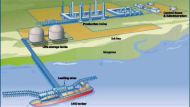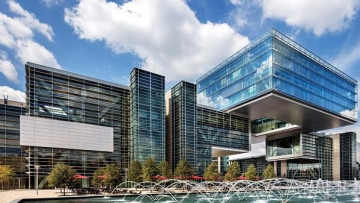Ex-Im bank undermines U.S. credibility at Copenhagen with $3 billion in financing for ExxonMobil
As global climate talks begin in Copenhagen, the U.S. Export-Import Bank (Ex-Im Bank) is undermining U.S Government goals by announcing its approval for a record-breaking three billion dollars in financing to the ExxonMobil-led Papua New Guinea Liquid Natural Gas project (PNG LNG).[1] [2] The PNG LNG project will emit vast amounts of lifecycle greenhouse gases, slash a pipeline through globally significant primary tropical forests, spew toxic pollutants, and foster an increase in violence in project affected areas.
The U.S. Ex-Im Bank´s provision of $3 billion in financing subsidies to Exxon conflicts with President Obama´s and other G20 leaders´ commitment in September to phase out fossil fuel subsidies as a step toward reducing greenhouse gas emissions and achieving an agreement in Copenhagen.[3]
The U.S. Ex-Im Bank estimates that PNG LNG will emit 3,100,000 tons of CO2 every year in direct emissions,[4] yet even this figure omits the much greater lifecycle emissions associated with LNG schemes which includes pipeline transport, liquefaction, tanker transport, re-gasificaion and ultimate combustion of this fossil fuel. According to a Carnegie Mellon study, lifecycle greenhouse gas emissions for LNG projects are more comparable to the lifecycle emissions of coal projects.[5]
"Ex-Im Bank´s $3 billion subsidy to the world´s most profitable oil and gas company for a massive greenhouse gas emitting project directly contradicts U.S. government commitments to cut fossil fuel subsidies and reduce greenhouse gas emissions," said Doug Norlen, Policy Director for Pacific Environment. "How can other governments take the U.S climate change commitments seriously if it is financing the increase of emissions through such fossil fuel projects?"
Papua New Guinea is home to world-class forest biodiversity. Within the country, nearly 80% of the PNG population depend on biological resources to sustain their physical, spiritual and social livelihoods. PNG has several thousand indigenous communities of diverse language, customs and traditions.
The environmental and social impacts of the PNG LNG project are severe. The LNG project includes an LNG liquefaction plant, a 407 km offshore pipeline, and a 248 km onshore pipeline, much of which will slash through previously undisturbed primary tropical forests with biodiversity of global significance.[6] The pipeline will impact remote tribal and communal lands, many of which have never before experienced a pipeline project of any kind, much less one of this magnitude.
The result is growing conflicts between communities and the company over revenues and land rights which have begun to turn violent. Local uprisings and conflicts about the project already occurred this past Fall.[7] In May 2009, Transparency International PNG publicly announced its "grave concern" about the transparency of project´s Benefit Sharing Agreement after the group´s invitation to serve as an independent observer at the fund´s negotiating forum was unexpectedly withdrawn.[8]
"These conflicts may presage more violence between local communities and a foreign oil giant that is viewed as stealing the peoples´land. Ex-Im Bank should have learned that lesson in Peru and Nigeria, but instead they expose themselves -and U.S. taxpayers- to increased risks and responsibility for increasing bloodshed," said Norlen.
Ex-Im Bank recently developed a Carbon Policy, under pressure from an agreement settling a lawsuit filed by environmental groups. However, environmental groups criticize Ex-Im Bank´s Carbon Policy for failing to actually curb carbon emissions and for the agency´s paltry support for renewable energy, which in recent years has been less than 2% of its financing for fossil fuel projects.
Ex-Im Bank financing of PNG LNG also turns a blind eye to corruption. In February 2009, the engineering firm Kellogg, Brown and Root (KBR) received the second largest criminal penalty in the history of the U.S. Foreign Corrupt Practices Act for arranging $182 million in bribes to secure engineering, procurement and construction contracts on Ex-Im Bank- financed Nigeria LNG project.[9] In June 2009, KBR announced that it and WorleyParsons have formed a joint venture, Eos, which has secured a similar engineering contract on the PNG LNG project.[10]
Notes:
Note: Other export credit agencies that are expected to provide smaller amounts of financing for PNG LNG, include the Australian Export Finance and Insurance Corporation (EFIC), Japan´s Nippon Export and Investment Insurance (NEXI), the Italian Istituto per i Servizi Assicurativi el Credito all'Espotazione (SACE), and the Korea Export Insurance Corporation (KEIC)/Korean Export Import Bank (KEXIM). Private banks potentially involved include ANZ, CBA, NAB, Westpac, BTMU, Mizuho, Sumitomo, Standard Chartered, BNP Paribas, Calyon, Credit Industrial et Commercial, Intesa Sanpaolo, UniCredit, SG, Natixis, DnB Nord and China Development Bank.
[1] The US Export-Import Bank is a US Government agency which provides financing and insurance for US companies seeking financing for projects abroad. Look here
[2] Look here
[3] See, inter alia, Preamble #24, main text #29-30, Leaders´ Statement, The Pittsburgh Summit, available here
[4]Look here
[5] P. Jaramillo, W.M. Griffin, and H.S. Matthews, "Comparative Analysis of the Production Costs and Life-Cycle GHG Emissions of FT Liquid Fuels from Coal and Natural Gas," Environmental Science &Technology, vol. 42, 2008, pp. 7559-7565.
[6] See project map:
[7] Upstream Online, Angry Landowners Attack PNG LNG Exec, available here ; See also Australia Network News, PNG Landowners Attack Government Ministers, available here
[8] Transparency International PNG
Press Release, available here
[9] Look here. See also Ex- Im Bank Approves it's largest private sector financing to Nigeria, $135 million in US Exports will help expand Nigeria LNG's production. Ex-Im Bank press release, September 30, 2002, available here
[10]


